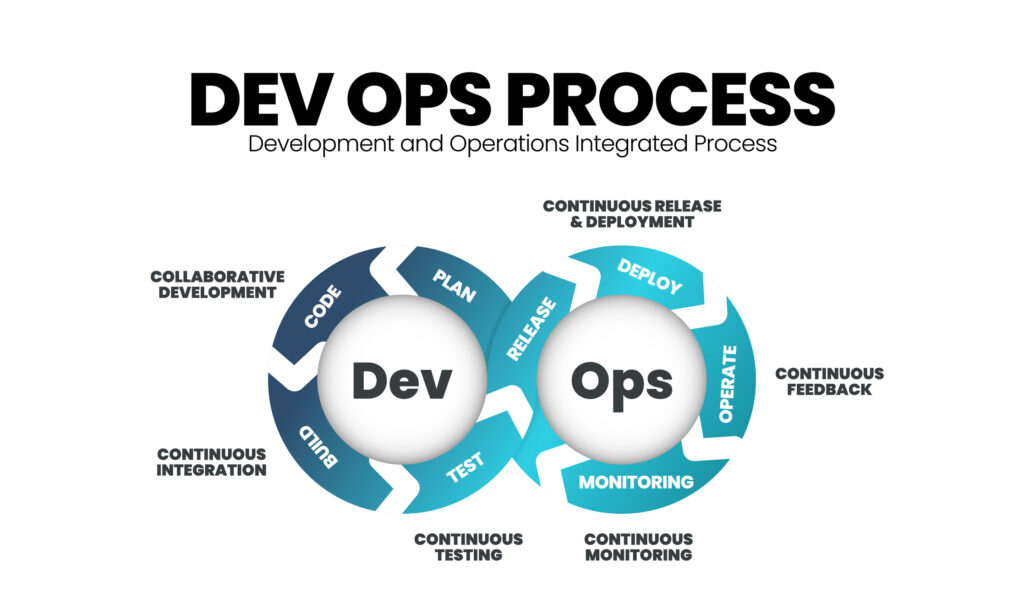Understanding DevOps | The Basics And Benefits
If you are involved with software development, considering developing an application, or managing a software application, then you probably have heard the term DevOps and some of the associated terms such as CI/CD and Containerization. You may have even read about some of the tools such as Kubernetes, Terraform, Virtual Private Cloud, RDS, and many others.
DevOps often feels like another language. This article is intended to help clear up some of the confusion surrounding the basic concepts of DevOps and why it’s so important to your software projects.
Basic Concepts – DevOps, CI/CD, Containerization, & Cloud Hosting
Let’s start with some basic concepts.
What is DevOps?
DevOps is a method that combines the software development teams and the operations teams into one group that works together. Some even describe it as a culture. The people that develop the software (developers) work hand in hand with the people that test the software (QA) and the people that deploy the software and manage the applications running on bare-metal servers or in the cloud (DevOps engineers). For more on how it evolved, see my previous blog post.
What is CI/CD?
Another core concept here is that of Continuous Integration / Continuous Delivery or CI/CD. I like to equate CI/CD to Agile Software development. CI/CD is a set of steps (and in some cases quite large and complex) to ensure the safe delivery of the application developed and tested by the development team on the hardware running on-premises or in the cloud. A properly designed CI/CD process enables the team to build, test, and deploy incremental pieces of an application rapidly (daily or even multiple times a day) with the least amount of human mistakes in the process.
What is Containerization?
The concept of Containerization is key to making everything run efficiently. Containerization refers to “packages” of everything required to support an application (like the server configuration, frameworks, libraries, network configuration, etc.) for quick deployment to a hosting environment. Equate it with moving everything in your home piece by piece, versus packing everything into boxes.
- Without Containerization, engineers build a development server piece by piece. They write the code (probably using libraries and a framework), set up the database, install any security measures or encryption certificates, etc. When it comes time to go to production, they need to replicate this whole environment, piece by piece, move it to the new environment/hosting, get it all up and running, and test it.
- With Containerization, the engineers distribute all that stuff into multiple containers that can run concurrently in single or multiple servers, then move these containers to any new environment all at once. In other words, the container bundles all the code and dependencies. One application can and should consist of many containers. Containers can hold different services and quickly deploy to most hosting environments (Local or Cloud). Containers can be scaled up or down separately – and this is the biggest advantage over standalone servers where scaling the server itself requires tremendous effort and upfront investment.
How Are Cloud and DevOps Connected?
All this typically happens in the cloud. Understanding some basics of the Cloud Environment can help. When most people think of DevOps we think in terms of the cloud. The cloud automates processes and removes the heavy lifting of manual tasks. Most larger applications are hosted in the cloud for a reason. That is because one can rent unlimited hardware, and return it without paying any upfront investment. It’s easy and fast
Servers owned and housed by a private company to support only that companies’ applications (local private hosting) can implement DevOps. If you use private servers, then you must manage all aspects of the environment, such as networking, storage, redundancy, firewalls, load balancers, etc. You need to monitor application health and performance, manage the DNS routing between servers, balance network, and server load, manage SSL certificates, and manage security.
That’s not to say the cloud handles everything. You still need to consider how to manage all these aspects of your environment. Often cloud requires decisions on which tools to implement, but a lot of the manual maintenance and housekeeping is automated. For example, if you are hosting an application yourself, you may need to manage storage space, power equipment, AC equipment, etc. In comparison, cloud storage is elastically scalable and will dynamically scale to meet the current requirements automatically. However, even in a cloud environment, you will still need to monitor application performance and reliability yourself to ensure you maintain a responsive application.
Common DevOps Tools – Kubernetes & Terraform
Kubernetes comes up frequently in the conversation around DevOps. It’s a cool name, but what is it? Kubernetes is an open-source application that helps with container orchestration. It helps automate deployment, scale, and networking. It makes it easier for DevOps engineers and developers to manage Containers.
Terraform is a tool that enables engineers to set up infrastructure as code which allows programmatic management and maintenance of any infrastructure. Using terraform someone with proper skills can configure any cloud like AWS or Azure. A Terraform code could configure numerous cloud services (like setting up EKS, RDS, and VPC on AWS … I explain this in another post) and any on-premises solutions like VMWare.
The Benefits of DevOps
By now, hopefully, these terms are starting to come together. But now that you understand the terminology – what are the benefits?
Easier On-going Maintenance
Deploying an application to the cloud isn’t the end – it’s the beginning. You still need to monitor your system to react proactively should any issues arise. A central console provides an easier way to keep an eye on the health of your system. Small issues are immediately spotted and fixed before they snowball into larger ones.
Avoid Knowledge Concentration
Properly configured, DevOps creates standardized processes and a set of tools. No single individual has all the information in their head. This enables any DevOps engineer to work on any project.
Faster Releases
As mentioned earlier, CI/CD allows for smaller, more frequent atomic and incremental releases. These releases are less prone to large, system-breaking bugs because smaller chunks of code are easier to test than large modules. It also enables quicker fixes and pivots based on user feedback. Rather than waiting weeks or months to roll out huge version updates, smaller chunks of functionality roll out regularly. Small, frequent fixes deployed quickly allow for faster issue resolution.
Greater Scalability and Reliability
Because of the standardization built into a sound DevOps methodology, you can scale your environment to support application load quickly and the whole is more reliable. Also, because logic rules can automatically restart processes and quickly alert to performance issues, the application is much more fault tolerant.
We Can Help
I hope this helps you better understand some of the concepts and tools surrounding DevOps. If this all seems like a lot to learn, don’t sweat it, Saritasa’s got you covered. We provide full DevOps services. Whether we built the project or take it over, we can help. We put a lot of time and effort into developing a DevOps service offering that is cost-effective, redundant, and utilizes the best tools available.
Recommended for You
Check out related insights from the team
Get empowered, subscribe today
Receive industry insights, tips, and advice from Saritasa.



